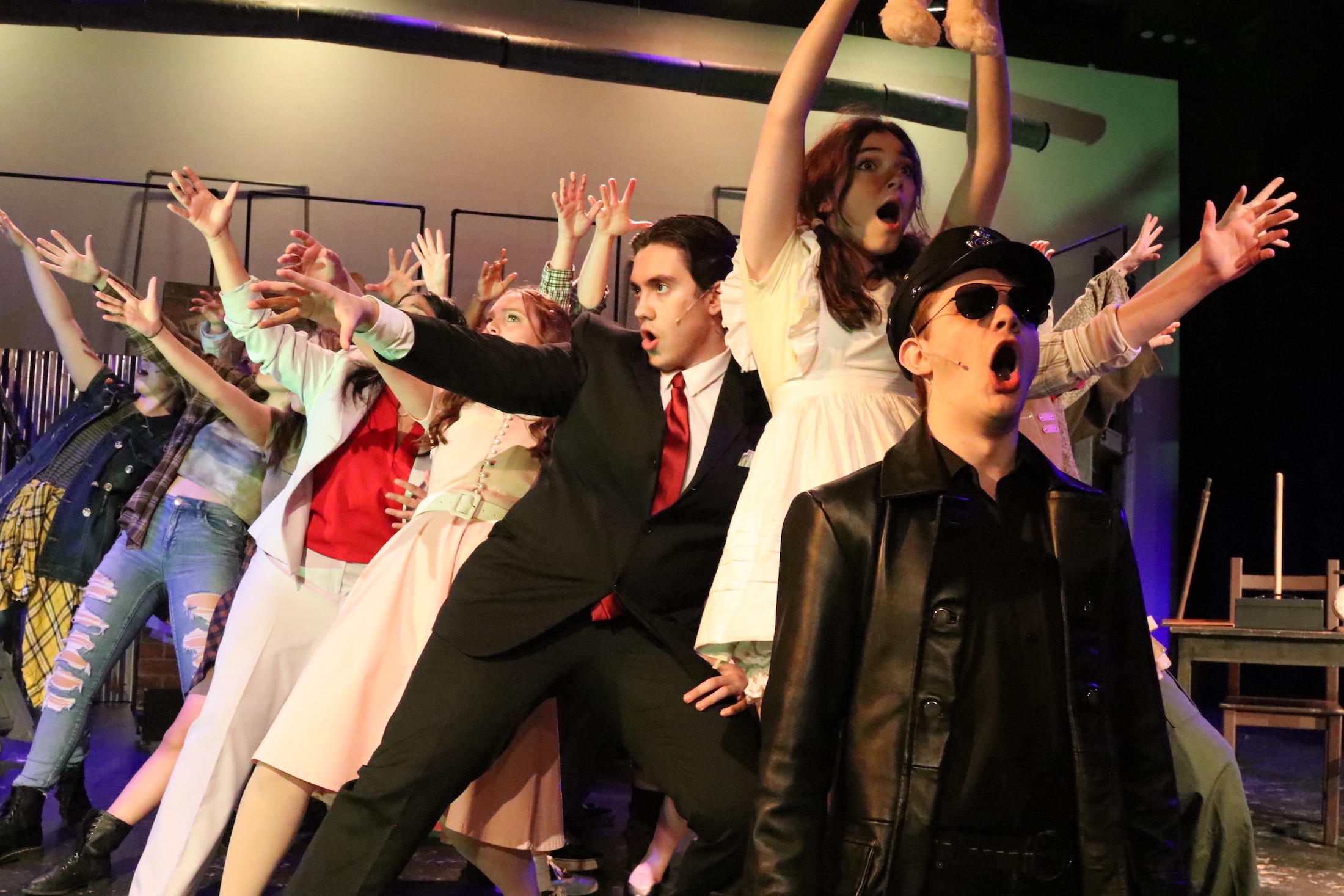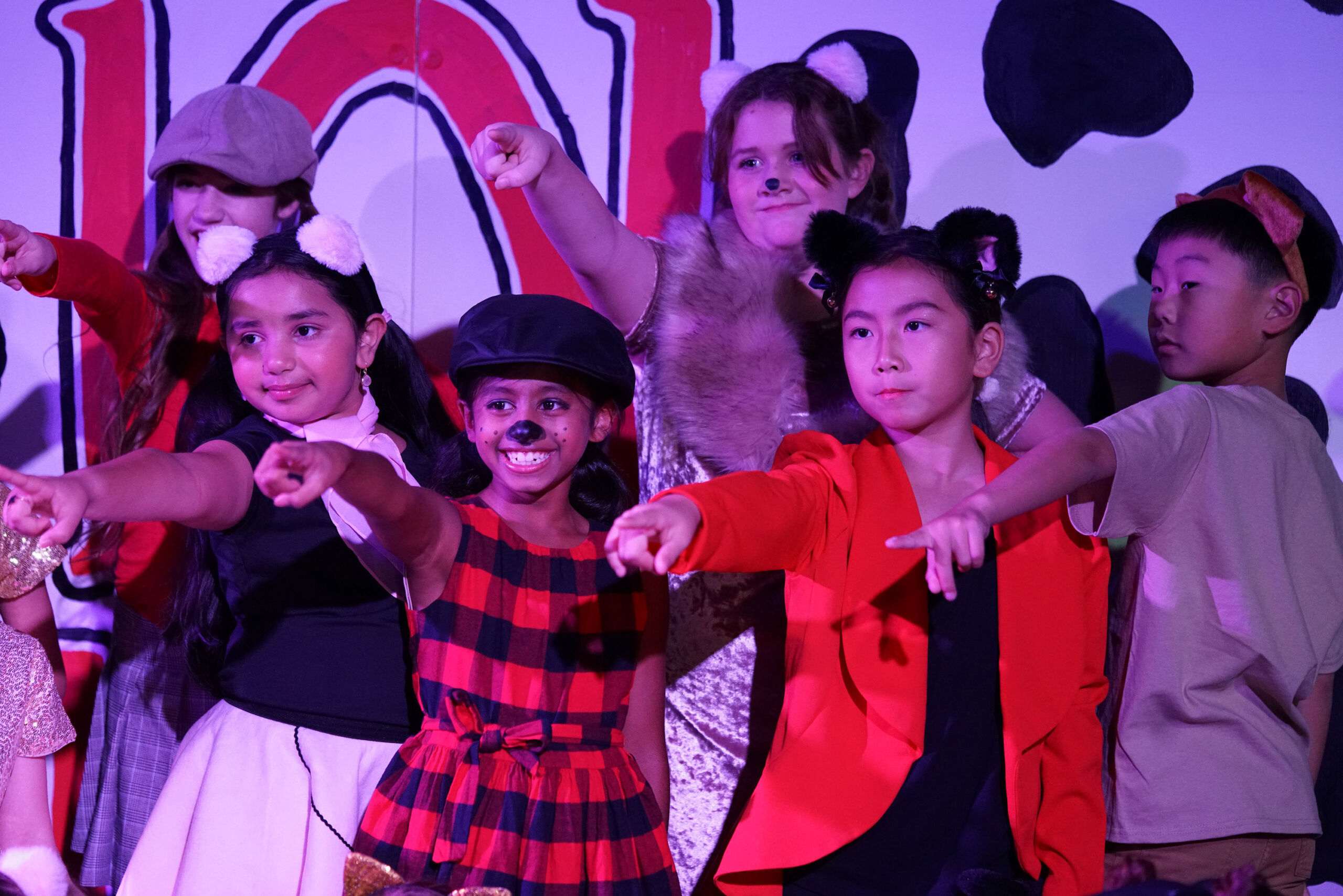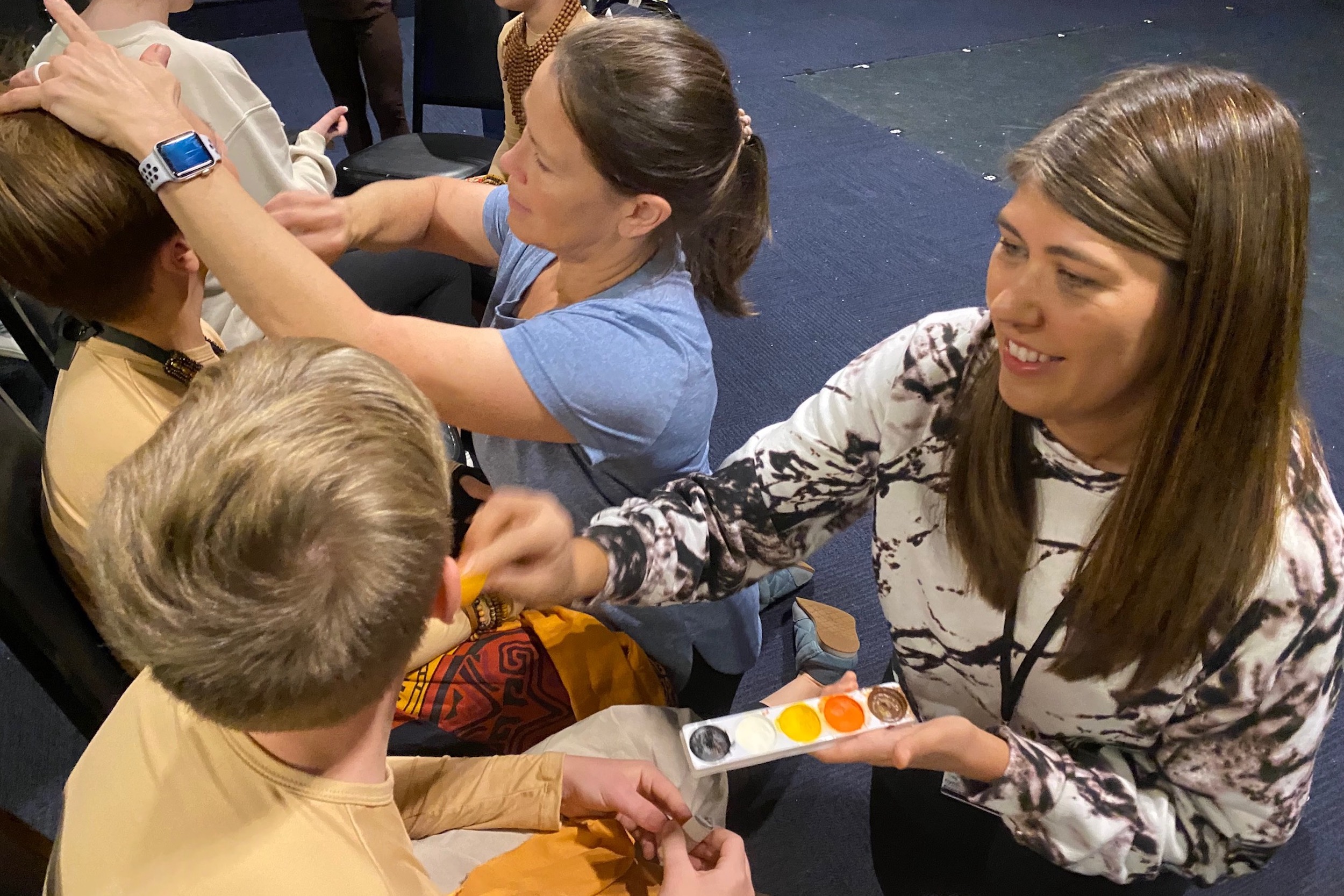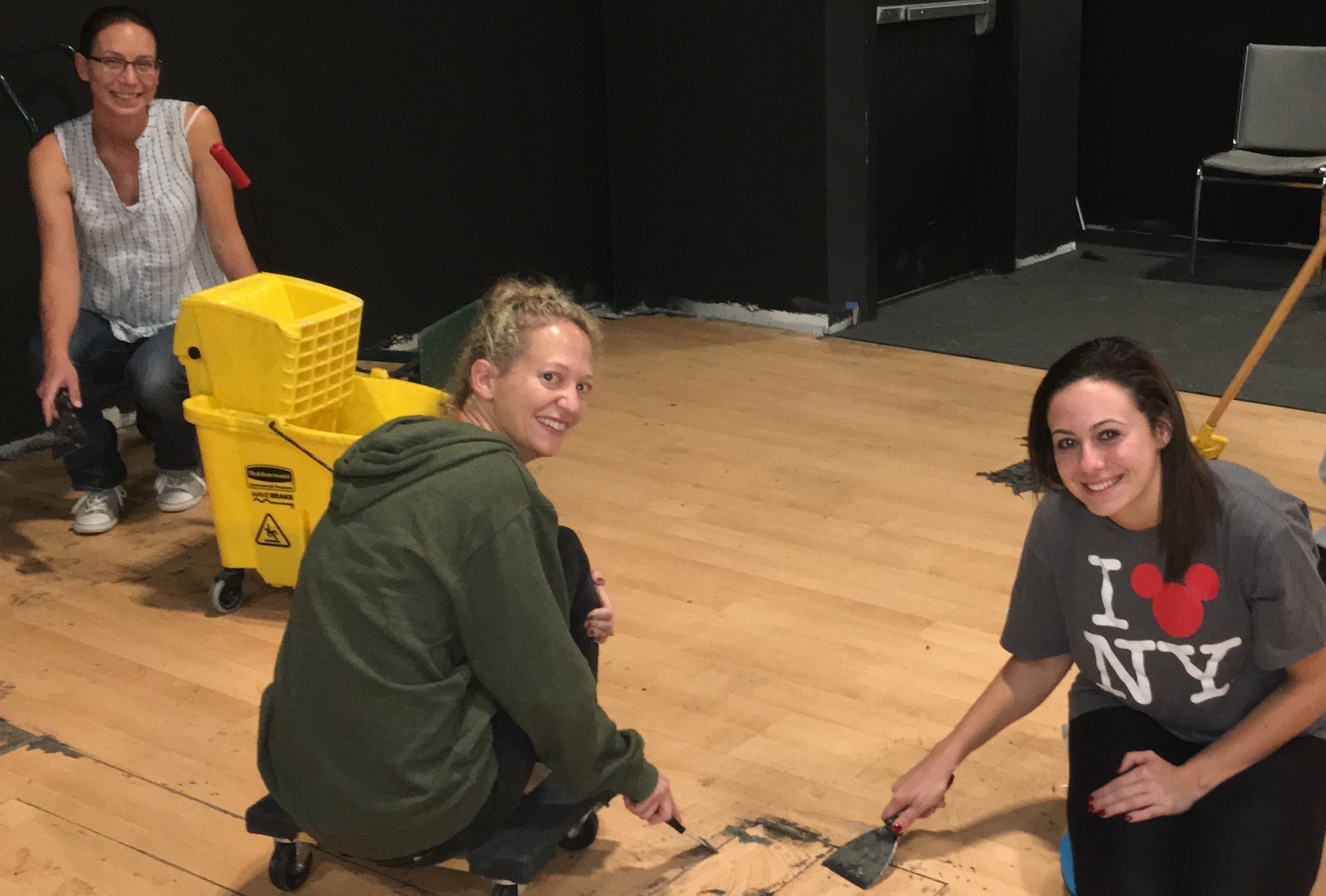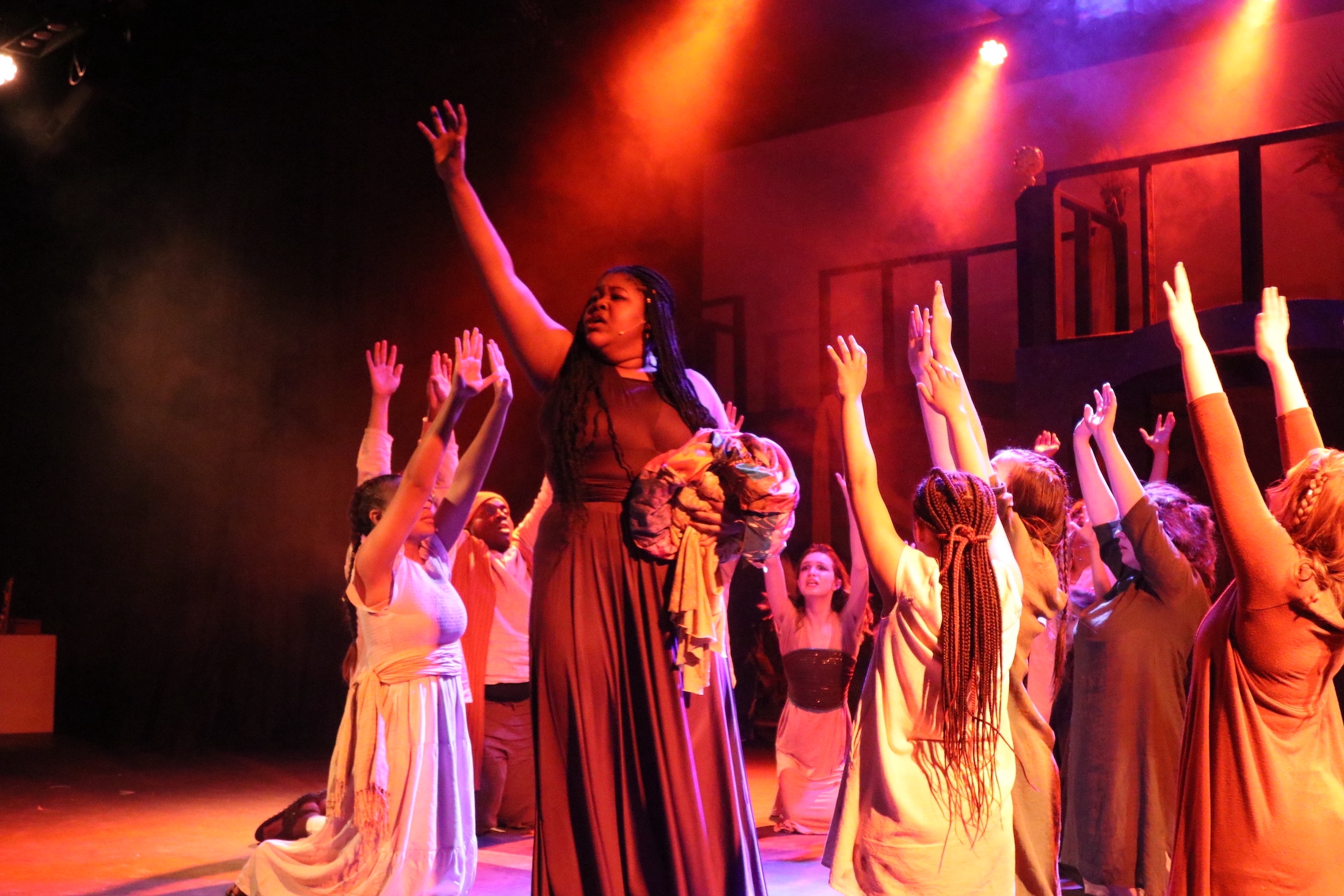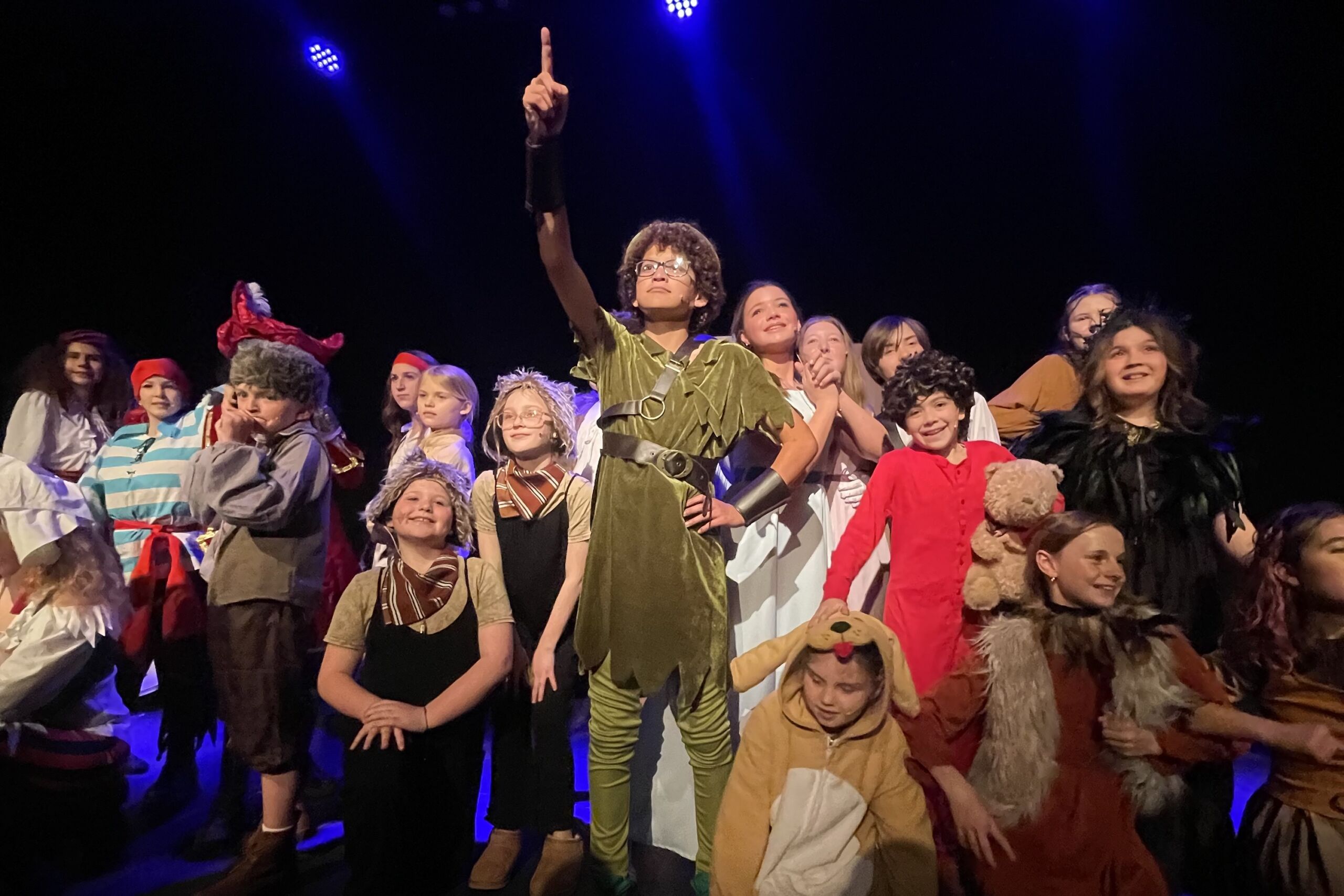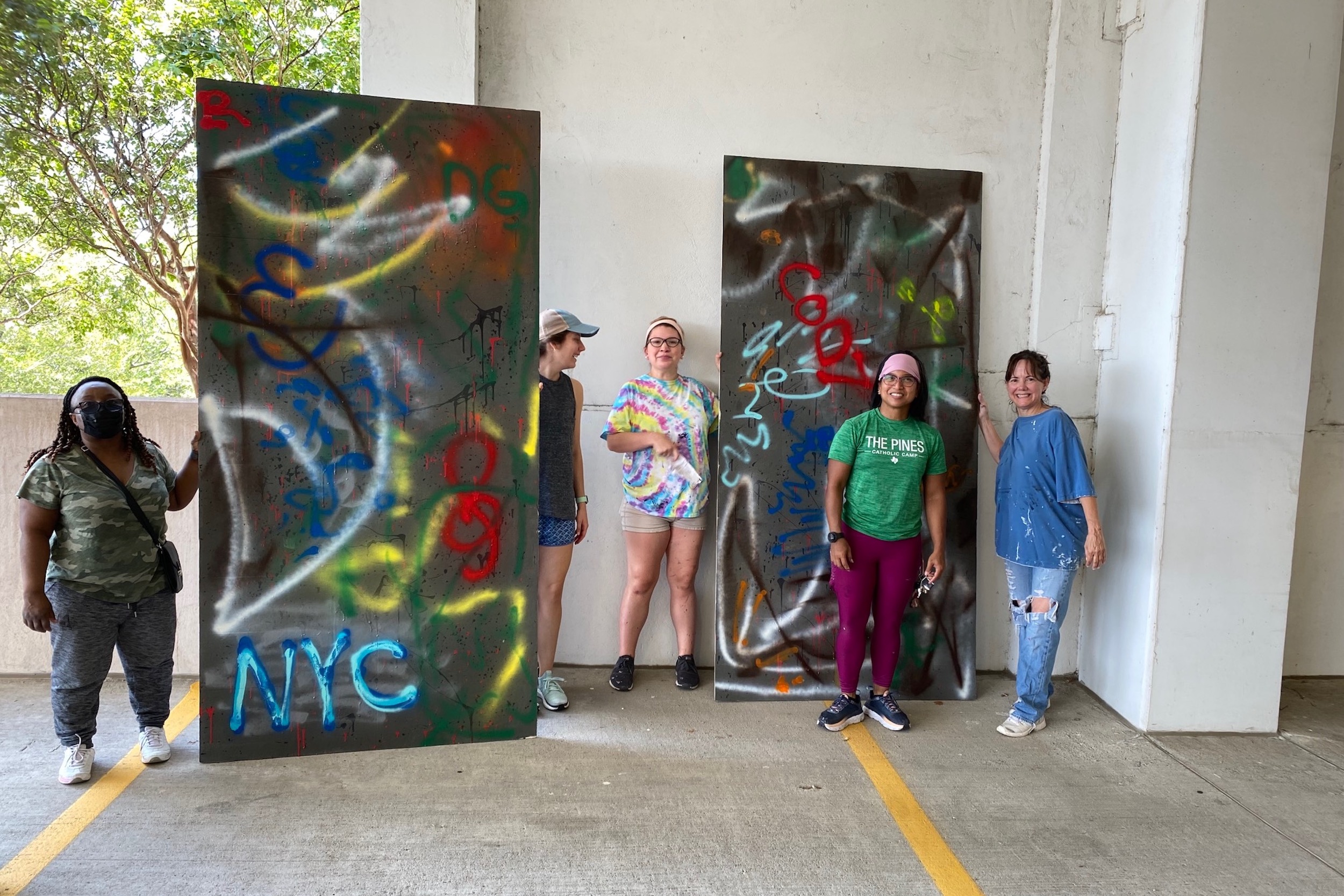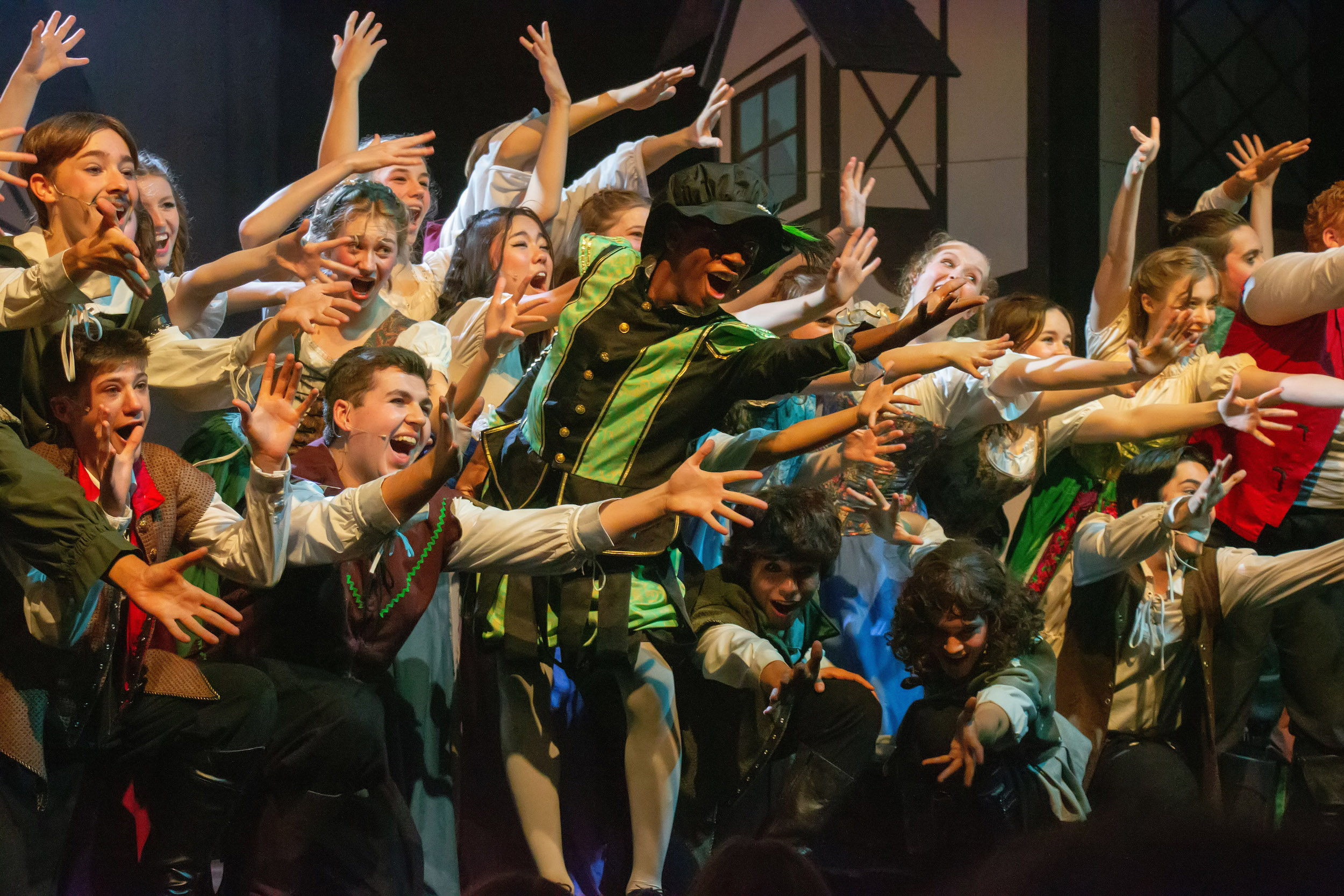What are the NTPA Ten Characters?
The NTPA Ten Characters were introduced ten years ago to serve as a guide for learning life lessons. These Ten Characters provide a guide to improvement and how the NTPA family works with one another. NTPA’s goal is to develop the “Character of Youth” by fusing the magic of theatre with the principles of our Ten Characters. Through storytelling, literature, song, and dance, we empower young actors to explore life lessons in a safe and supportive environment while building confidence, resilience, and well-being before they face those challenges in the real world.
The Ten Characters of NTPA
★ Teamwork
★ Leadership
★ Responsibility
★ Respect
★ Self-Confidence
★ Integrity
★ Discipline
★ Gratitude
★ Positive Attitude
★ Love One Another
Defining the Ten Characters
NTPA teaches and improves student’s skills in acting, music, and dance. More importantly, we hope our youth take away the life skills of our Ten Characters, and adopt them to guide their life’s journey. Studies show these programs improve the well-being, happiness, confidence, and resilience of our youth.
The definitions below are intended to place the Ten Characters in the context of the age and maturity of students, and provide guidance for how they might best adopt the Ten Characters in their lives. Click on each character below to explore how we define these for each age group.
TEN CHARACTERS FOR KIDS
Written for Kids through 5th Grade, the Ten Characters for Kids offers guidance for adopting the Ten Characters to shows and beyond!
Teamwork means working happily with everyone to make our show the best it can be. I know that everyone is trying their best and we all need to work together. If I see someone else that needs help, I will do my part and help others when they need it. I will say “thank you” to those who help and make sure everyone feels included and important.
Responsibility means doing what I say I will do and keeping my promises. I will make good choices and own up to my mistakes. If I mess up, I will try to make it better and not blame others. I will apologize when I don’t do what I said I would, and when I make mistakes, I will work to do better next time. I also know that everyone makes mistakes and forgive myself when I mess up. I will show that I can be trusted and care about what I do or don’t do might impact others.
I will respect everyone by listening to my director, volunteers, and fellow actors, and following the rules of NTPA. I will take care of the theatre and everything in it because the theatre is important to me. Before I say something or do something, I will think about what that might do to someone else. I will always be kind and supportive to everyone, making sure we all work together to put on a great show.
Self-confidence means believing in myself and knowing that I am special, even if I make mistakes. I will try my best and trust my abilities. I will be brave when trying new things and know that it’s okay to ask for help. I will cheer on others and be proud of who I am.
Integrity means being honest and always telling the truth, even when it’s hard. I will do the right thing, even if no one is watching. I will keep my promises and play fair. I won’t make up stories or gossip, and I will be a friend people can trust.
Discipline means practicing and working hard, even when it’s not easy. I will learn my lines, be on time, and follow instructions to make our show great. I will take care of myself by getting enough sleep, eating healthy food, and telling my parents or directors when I don’t feel well. I will keep trying, even when things get tough.
Gratitude means being thankful for the good things in my life and the people who help me. I will say “thank you” often and mean it. I will show appreciation to my castmates, directors, and everyone who helps us. Even when things are hard, I will find something good to be grateful for.
A positive attitude means trying my best and having fun, even when things are hard. I will smile, stay hopeful, and think of ways to make things better. I will cheer for my friends and help them when they need it. I will never give up and always try to make the best out of every situation.
TEN CHARACTERS FOR MIDDLE SCHOOL
Written for youth in Middle School (grades 6-8), adapting challenges of social media and other realities for this age group.
Teamwork means working together and supporting each other to reach our goals, whether on stage or in our everyday lives. It’s about recognizing that we can accomplish more as a group than on our own. I’ll always look for ways to work with my castmates and directors to solve any problems we face. I will trust my team members to fulfill their roles and do my own part to fulfill mine. I will do my part, help others when needed, and make sure everyone feels included and valued. When using social media, I’ll be mindful of how my actions can uplift and support my team.
Being a leader means I’ll guide and support others by setting a good example and inspiring everyone to reach our goals. I’ll listen to people, respect their ideas and who they are, and help them feel strong and confident. I’ll lead with humility, acting like a ‘servant leader,’ and focus on serving those I lead. I’ll make sure to share my honest thoughts clearly. I’ll face challenges bravely, even if it means making choices that not everyone likes. I’ll stay positive and encourage others to keep trying and not give up. I know that being a leader isn’t just about having a title or position. A good leader lives by and promotes important values and qualities.
Responsibility means owning up to my actions and understanding the good and bad things that can happen because of my choices. It’s about knowing I can choose how I act and react to things. By being responsible, I’ll try to make good decisions for myself and my friends. I’ll accept my strengths and weaknesses and understand that mistakes happen. When I promise to do something, I’ll do it, and if I don’t or I make a mistake, I’ll say that I am sorry and really mean it. I won’t blame others for my failures and remember that when I point a finger at someone else, three fingers are pointing back at me, reminding me that I probably could have done something to make it better.
Respect means appreciating what everyone does, whether they’re on stage or behind the scenes, and treating them with kindness and fairness. It means showing up on time, being prepared, and fully committed to rehearsals and performances because everyone’s time and effort matter. Respect means cleaning up after myself and making sure I don’t leave a mess. By respecting the script, the director, and the work of my castmates, I’ll help create the kind of space where we can all do our best. No matter how different someone is from me, I’ll treat everyone with empathy and kindness, and make sure they know they are valued. I will always treat adults, especially parents, leaders, and volunteers with respect. We show respect for ourselves by respecting others.
Self-confidence means believing in myself and knowing my worth. It’s about trusting my abilities, trying new things, and not worrying about being perfect. I will be proud of who I am, stay open to learning from others, and focus on my own journey instead of comparing myself to others or what I see online. I understand that my value doesn’t come from likes or comments but from being true to myself. Even when I face challenges or make mistakes, I will stay confident and focus on how I can learn from the experience. I will speak up for myself and others, remember that everyone has strengths and flaws, and keep loving the person I’m becoming. My confidence comes from within, not from what others think.
I show integrity when I’m honest, trustworthy, and stick to my values, even when it’s tough. I will make sure to be truthful with my friends, cast members, directors, parents, and everyone around me. I won’t spread gossip and will only share things that are true and my story to tell. I’ll think carefully before posting or sharing anything online because I know it reflects who I am and can be out there forever. I show integrity by doing the right thing, even when no one is watching, and by understanding that my words have power and should be used carefully and truthfully. If I don’t respect the truth, I can’t expect people to trust or listen to me. Integrity also means keeping my promises, playing fair, and not cheating. People can count on me to be fair and dependable.
Discipline means pushing myself to stay focused and keep going, even when things are hard. It’s about setting goals, using my time wisely, and focusing on what I need to do to complete my work. In theater, it means practicing my lines, movements, and songs to get better, and showing up on time, ready to work. I will try my best, learn from my mistakes, and keep working to improve. Discipline also means balancing school, activities, and taking care of myself. I’ll make sure to get enough sleep, eat healthy foods, and brush my teeth and stay clean so I feel my best. I’ll know when social media is distracting me and put it away when I need to focus.
Gratitude means noticing and appreciating the good things in my life and the people who help me. It’s more than just saying “thank you”—it’s about really feeling thankful, even when times are tough. I’ll try to see challenges as ways to learn and grow. Being grateful can make me and others happier, and it helps build stronger friendships. I’ll make sure to thank my castmates, directors, volunteers, and anyone who supports me, and I’ll help spread positivity in our theater. Gratitude isn’t about getting the best role or having cool stuff; it’s about being thankful for what I do have and not taking anything for granted.
A positive attitude means staying hopeful and looking for solutions, even when things aren’t going great. It’s about coming to rehearsal excited, ready to learn, and I will cheer on my castmates because I know that a positive vibe helps us all do our best. When things go wrong, I’ll stay hopeful and look for ways to solve the problem without complaining. Even if I am having a bad day, I know that smiling and staying positive can make a difference for me and others. I’ll be careful not to spread bad thoughts or words, especially online, and instead, I’ll try to be someone who lifts people up. No matter how tough things get or how sad I feel, I’ll remember that there’s always hope, things always get better, and I won’t give up.
TEN CHARACTERS FOR HIGH SCHOOL
Written for youth in High School (grades 9-12) this adapts the Ten Characters to the challenges and expectations of maturity to adulthood.
Teamwork means recognizing that we can achieve far more together than we ever could on our own. It’s about actively contributing to group efforts and supporting the people around us, both on and off the stage. I will be someone my team can rely on, respect the work of others, and help solve problems as they come up. Even on social media, I will consider how my words and actions reflect on the team and aim to uplift and support those I work with. I know that true teamwork means that when one person on the team succeeds, we all succeed. We don’t win by making others lose or feel less important; instead, we rise together and celebrate each other’s victories. Our goal is for everyone to feel valued and to know that we all share in the success we create as a team.
Leadership is about setting a strong example and using my influence to inspire and empower others towards our goals. It’s not just about having a title but about taking initiative, communicating clearly, and being there for people, even when it’s hard. I will make thoughtful decisions, stand up for what’s right, and listen to others with an open mind. I want to lead “servant leader” with humility, serving those I lead. I will take the time to clearly communicate my honest thoughts. I will face challenges with courage, and know that sometimes I may have to make unpopular decisions. In our social media-driven world, I will use my voice wisely to promote positivity and respect. True leaders make sure everyone’s ideas are heard and bring out the best in those around them.
Responsibility means owning my actions and understanding that my choices—whether in person or online—have real consequences. It’s about keeping commitments, being reliable, and holding myself accountable when things go wrong, without making excuses. I will think carefully before I act, recognizing my power to shape my behavior and its impact on others. True responsibility involves making ethical choices, acknowledging my strengths and weaknesses, and embracing mistakes as opportunities to grow. When I fall short, or do or say something wrong, I will own up to my mistake, apologize sincerely and seek forgiveness, and then I will forgive myself, knowing that we all make mistakes. I will always remember that when I point a finger of blame at someone else, three fingers are pointing back at myself, reminding me that I probably could have done something to make it better. I also recognize that while I may portray characters onstage with complex behaviors, I am responsible for distinguishing myself from them and not adopting their actions or shortcomings.
Respect is treating everyone—friends, directors, teachers, family, and even strangers—with fairness, kindness, and understanding. It means being aware of how my words and actions affect others and choosing to be considerate, even when we disagree. I will respect people’s differences, honor their boundaries, and recognize the dignity of every person. By respecting the script, the director’s vision, and the work of my peers, I will help create a supportive and professional environment where we can all shine. Respect for others means cleaning up after myself and making sure I don’t leave a mess that others have to clean up. On social media, I’ll be thoughtful and avoid saying anything I wouldn’t say in person.
Self-confidence means I will trust in my abilities and contributions, embracing my role and who I am with assurance. I will be present in rehearsals and perform with conviction, believing in the value I bring to the production. When faced with challenges or mistakes, I will maintain confidence in my ability to overcome them and learn from the experience. I will love myself, and know that everyone is imperfect. Self-confidence is believing in who I am and embracing my strengths and flaws. It’s about trusting myself to make good decisions while being open to growth and feedback. I understand that comparing myself to others isn’t helpful because we are all different and special in our own ways, and so I will focus on my own journey instead. I will stand tall, speak up for myself and others, and learn to love the person I’m becoming. My confidence comes from within, not from the approval of others.
I show integrity when I am honest, trustworthy, and consistent in my actions and values, even when it’s difficult. I will be intentional about being honest with my cast members and directors, parents and all others around me. I refrain from gossip by making sure what I say is truthful and is my story to tell, especially on social media , and I’ll think carefully before posting or sharing anything, knowing that what I put out there reflects my character and is on-record forever. I show integrity when I do the right thing, even when no one is watching. I know that words matter, and the truth matters, and I understand the power of words and the importance of truth, and I will always communicate truthfully. I know that if I don’t have respect for truth in my words, I can’t really expect anyone to want to listen to me. I show my integrity when I don’t make commitments or promises that I don’t keep, and when I play by the rules and don’t cheat.
Discipline means pushing myself to stay focused and committed, even when things get tough. I will take time to think and reflect, and plan out my days. I will write down my goals that give me focus and dreams for what I want to do, and work each day to make them happen, managing my time wisely to complete what I need to do. In theater, this means practicing lines, movements, and songs regularly to improve my performance and showing up to rehearsals prepared and on time. I will stay focused and work hard to overcome challenges, learning from my mistakes and always striving to be better. Discipline also involves balancing my commitments—school, activities, and self-care—so that I can succeed in all areas of my life. I understand the importance of taking care of my physical and mental health by getting enough sleep, eating well, and maintaining good hygiene. I will also recognize when social media becomes a distraction and know when to set it aside to prioritize what matters most. Finally, I will refrain from substances like drugs, alcohol, and smoking, understanding that my mind and body are the instruments I use to create and achieve my best.
Gratitude means taking the time to appreciate the good in my life and the people who support me. It’s more than just saying “thank you”—it’s a proactive and mindful attitude of appreciation, even during challenging times. I will find reasons to be thankful, seeing setbacks as opportunities to learn and grow. Gratitude has the power to bring happiness, foster kindness, and create deep connections with others. I will express my gratitude genuinely to everyone in my theater family and beyond, from my castmates and directors to volunteers and others, because gratitude makes our community a more positive and joyful place. I will also remember that gratitude isn’t about the roles I receive or the material things I have; it’s about choosing to focus my energy on being thankful for all that I do have. By being mindful and not taking things for granted, I will make small acts of gratitude that can have a big impact on those around me.
A positive attitude means choosing to stay hopeful and proactive, even when things get tough. It’s about approaching every rehearsal and performance with energy, enthusiasm, and a willingness to learn. I will support my castmates by celebrating their successes and lifting them up, knowing that a positive environment helps everyone do their best. When challenges arise, I will look for solutions, keep a sense of humor, and remind myself that setbacks don’t define me—they are opportunities to grow and learn. Even when it’s hard to feel positive on the inside, I know that something as simple as a smile can help me and others feel better. I will be mindful of how easily negativity can spread, especially online, and make a conscious effort to be someone who brings optimism and encouragement to every situation. No matter how difficult things get, I will always remember and truly believe that things are never hopeless, bad situations will always get better, and I will never give up.
Character of the Month
Each month, NTPA will highlight a “focus character,” giving our students and staff the opportunity to focus in on one of the Ten Characters during that month’s rehearsals, classes, and other activities.
Each month, youth who have best illustrated that month’s character may receive a focus wrist band or online recognition as our student of the month. Selected students will be determined by NTPA directors and management.
Click on each month below to see the “focus character” and the significance of this character for each month.
JANUARY – NEW YEAR KICK-OFF, TEN CHARACTER RESOLUTIONS
January is a time when we reflect on the past year and make resolutions to improve ourselves. This makes it the perfect time to introduce or re-commit to NTPA’s “Ten Characters.” By setting clear resolutions that align with these core values, individuals can establish personal growth goals for the new year.
Band color: Rainbow.
FEBRUARY – LOVE ONE ANOTHER
February, marked by Valentine’s Day, is a celebration of love, making it an ideal time to focus on the character trait of “love one another.” This month is a reminder of the importance of kindness, empathy, and compassion in our interactions. Whether in personal relationships, the workplace, or the community, fostering love and understanding creates harmony and strengthens bonds.
Band color: Pink
MARCH – INTEGRITY
National Theater Day is in March, reflecting our appreciation for the impact of theatre on our lives. March is selected for Integrity linked famously to the “Ides of March”, historically known for the betrayal and assassination of Caesar as depicted in Shakespeare’s Julius Caesar, is a powerful reminder of the consequences of dishonesty and the importance of integrity in leadership and relationships. The writs band color is in respect for St. Patrick’s Day, also celebrated in March.
Band color: Green
APRIL – LEADERSHIP
April’s focus on leadership aligns with National Volunteer Day, emphasizing the concept of “servant leadership” — leading by serving others. Volunteerism is a powerful expression of leadership because it requires individuals to step up and take responsibility for creating positive change. By linking leadership to service, this month encourages participants to think of leadership not as a title or position but as an opportunity to guide, support, and uplift others in their community. The band color is selected for its relationship to royalty and leaders.
Band color: Purple
MAY – RESPECT
Memorial Day in May is a time to honor and respect the sacrifices made by those who have served in the military. This month’s focus on respect is tied to this solemn reflection on the courage and dedication of others, and we honor their sacrifice for our own freedom by offering respect for all of those around us, and the principles of freedom, commitment, and service to one’s country.
Band color: Gray
JUNE – POSITIVE ATTITUDE
June 5 is Positive Attitude Day, which makes it a fitting time to promote the power of maintaining a positive mindset. As summer begins, June is full of possibilities, and having a positive attitude is crucial for embracing opportunities and overcoming challenges. Positive energy is contagious, and this month reminds us of its role in achieving success and happiness.
Band color: Yellow
JULY – DISCIPLINE
National Discipline Day held in July offers a chance to focus on the importance of discipline in achieving long-term goals. July, situated in the middle of the year, is a great time to reassess goals and apply renewed focus and self-control. This month’s emphasis on discipline highlights the necessity of staying committed, pushing through obstacles, and maintaining consistency in our actions.
Band color: Old Glory Blue
AUGUST – RESPONSIBILITY
August is a time of transition as students return to school, making it an ideal month to focus on responsibility. Going back to school requires young people to step up their responsibilities — from academics to personal development. World Humanitarian Day, also in August, adds a global perspective, reminding us of our collective responsibility to help those in need and contribute to the betterment of humanity. The color is selected in honor of World Day.
Band color: Light Green
SEPTEMBER – TEAMWORK
Labor Day, celebrated in September, originated from the labor movement, which emphasized the power of collective bargaining and teamwork. It is also the opening month of the football season, like theater, a team sport where every role is critical. Whether in the workplace, at school, or in the community, working together helps achieve common goals and fosters a sense of unity and collaboration.
Band color: Red
OCTOBER – SELF CONFIDENCE
October’s focus on self-confidence aligns with National Self-Confidence Day. As fall progresses and the year starts winding down, it’s a good time to reflect on personal achievements and build self-assurance. Self-confidence is crucial for success in all areas of life — from performing on stage to making important decisions. This month encourages individuals to embrace their strengths, trust in their abilities, and step out of their comfort zones, reminding them that confidence is key to personal growth and achievement. Orange
Band color: Orange
NOVEMBER – GRATITUDE
November’s theme of gratitude naturally fits with Thanksgiving, a holiday centered around giving thanks and appreciating the good in life. This month encourages individuals to reflect on their blessings and express gratitude for the people, opportunities, and experiences that enrich their lives. Gratitude is an important aspect of character, as it helps to foster a positive mindset and strengthen relationships. By focusing on gratitude in November, we are reminded of the importance of thankfulness as we enter the holiday season.
Band color: Turquoise
DECEMBER – TEN CHARACTERS REVIEW
As the year concludes, December offers an opportunity to reflect on the Ten Characters and how they’ve been applied throughout the year. It’s a time for self-assessment, looking back at the resolutions made in January and evaluating progress. By reviewing the lessons learned and the growth achieved, December encourages a thoughtful close to the year, preparing individuals to carry these values into the new year with even more intention and commitment. This reflection ensures that the journey of character development is continuous and ever-evolving.
Band color: Rainbow
Research on the Benefit of the Performing Arts on Youth Well-being
There has been significant research on the psychological and physiological benefits of performing arts in the lives of youth of all ages. Check out the link below to read articles on this topic.

